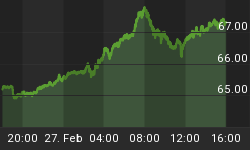Since the election 10-year treasury rates are up 0.405 percentage points. Since October 1, rates are up 0.665 percentage points.
Because mortgage rates closely follow 10-year treasury rates, there is panic in the mortgage market, especially from buyers who have not yet locked in rates.

Trump Win Juices Mortgage Rates
The Wall Street Journal reports Trump Win Juices Mortgage Rates.
Mortgage rates have spiked in the wake of Donald Trump's election victory.
Average rates on 30-year fixed conforming mortgages hit 3.87% on Thursday, climbing a quarter of a percentage point since Tuesday's market close, according to MortgageNewsDaily.com, which tracks mortgage rates. That is the biggest increase in a two-day period since June 2013 when the Federal Reserve announced its plan to start easing its stimulus program, according to the site.
Mortgage Mortgage Rates Skyrocket to 4%
The WSJ numbers are from last Thursday. Rates spiked again on Monday.
Mortgage news Daily says Mortgage Rates Skyrocket to 4%. New Normal?.
It's been a long time since anyone could say that top tier conventional conforming 30yr fixed mortgage rates were at 4%. Indeed, even last Monday, the thought of 4% rates would border on preposterous. But what a difference a week makes! Over the past 3 days, rates have moved higher at a pace that's only matched by the worst 3 consecutive days of the mid 2013 taper tantrum. There were several days in 1987 were rates moved higher more quickly on an outright basis, but the more recent spikes have constituted much larger proportions of respective ranges. In both cases (1987 and 2013), the recent major highs in rates occurred 6 years early. Simply put, the 2013 rate spike traversed more of its 6-year range than the 1987 spike, and the past 3 days have matched 2013's pace.
Granted, by the time we look at the weeks and months that preceded the 2 most recent rate spikes, 2013 remains a bigger overall move toward higher rates. But that same caveat is the reason the current rate spike is as scary as it is: we don't yet know what the coming weeks and months will look like! As recently as last Thursday, quite a few market participants figured that rates had gotten so much higher so quickly, that it surely must have been a knee-jerk reaction to the presidential election that would soon be reversed after the 3-day Veteran's Day weekend. Yet here we are on Monday with rates still surging higher.
For most of the Summer, rates never moved outside an eighth of percentage point range. Even when rates are trending higher or lower, it typically takes weeks to see a move to the next eighth point increment. Now we've seen rates move an eighth of a point higher on EACH of the past 3 business days. This has only happened a handful of times, ever.
Mortgage Rate Panic
Diana Olick says Panic in housing market as Trump effect pushes mortgage rates to 4%.
"The situation on the ground is panicked. Damage control," said Matthew Graham, chief operating officer of Mortgage News Daily. "People were trying to lock loans quickly last week and are now facing a tough choice to lock today or hope for a bounce. Many hoped for a bounce last week heading into the long weekend and we obviously didn't get it."
Mortgage rates follow loosely the yield on the 10-year Treasury bond. That yield on Monday hit the highest level since December, as investors flooded the stock market and pulled out of the bond markets. The runup on stocks is backed by a belief that the Trump administration will be a boon to the economy overall and the banking sector specifically.
Higher mortgage rates, however, will throw a wrench into an already shaky housing recovery.
Economists at the Mortgage Bankers Association are now predicting that rates will, "trend higher than we had previously forecast, which will more quickly decrease refis." They still predict a strong home purchase loan market, but they say they will have to "assess the impact of policies as they are rolled out with respect to overall growth and housing market implications."
Inflation Scare or the Real Deal?
I am inclined to believe this is an inflation scare. The market is pricing in lots of things that may not happen: a stronger recovery, quick spending in infrastructure, Fed rate hikes, and an inflation boom caused by Trump.
I think the strong dollar will put a damper on exports, a global trade war will slow growth, Christmas spending will be weak, dealers will have to offer even bigger discounts to sell cars, and the rise in rates sure will not help housing.
stronger inflation may be coming, but it will take time. Meanwhile the above list is strongly disinflationary, as is a falling yuan and falling oil prices.
The market is likely way ahead of itself here. The Fed can now hike, however, just as it wanted to do. Hallelujah.
At the current pace, assuming the Fed does hike, the pace is glacial, once a year, in December.
Central banks have a multitude of things to worry about: Brexit trade wars, Trump-sponsored trade wars with China, car inventory, and a slowing US housing market.
There is simply far too much consensus about inflation for my taste, and the irony is that it comes from the very same people who thought a Trump election would send the markets and the economy crashing.
Related Articles
- Make Inflation Great Again! Is Trump the "Inflation President"? Spotlight on Bonds, Oil, Gold, Attitudes
- Shades of Great Depression and Smoot-Hawley: Sarkozy Proposes Carbon Tax on US, Anti-Dumping Tax, Buy-EU Act















